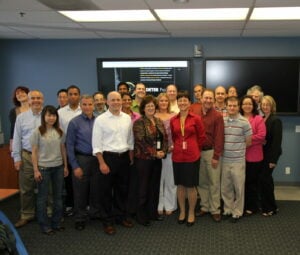This article has been revised and corrected from the original version.
As cyber attacks become more sophisticated and defense mechanisms remain slow to catch up, the Deter Project team has focused its efforts on research and acting as a cyber defense-technology test bed.
Since 2004, the team, comprised of staff from the USC Information Sciences Institute and the University of California, Berkeley, has sought to close the gap between attacks and prevention.
Terry Benzel, ISI director of the networking and cybersecurity division and principal investigator at Deter, said California’s size and large technology industry make the state vulnerable to cybercrime.

In 2020, California reported cybercrime losses of more than $621 million, which led the nation. Between November 2020 and October 2021, there were almost 24,000 cyber-security incidents worldwide, 2,065 detected in small companies, according to Statista.
“We have a lot of technology companies, a lot of tech space and…a fair amount of manufacturing and large businesses. Each one of those presents a different opportunity for attackers to find a way to get in to do the attacking,” Benzel said. “We build a lot of technology, but unless we take the time to understand what the cyber threats are and build that into all of the technology and all the tech companies, then we’ve opened up the door.”
Benzel said that prevention is key.
“The bad guys have the whole world as their test beds. They can go out and try out an attack largely unnoticed and unknown and at a huge scale. The good people don’t necessarily have that,” Benzel said.
The Deter laboratory is equipped with hundreds of computers and specialized software that allows researchers to try out defense mechanisms in a virtual internet environment without jeopardizing the actual internet.
“You can set up these computers with the software we give you so that some of them are bad guys attacking and some of them are the defenders, and you can play out an attack-defense scenario, capture the data and analyze it,” Benzel explained.
Benzel said the best an organization can do is practice good “cyber hygiene.”
“It’s very important that businesses set up their systems, manage them and maintain them. Install all those updates and teach your people not to click on phishing bait,” she said. “These things are absolutely critical, and that’s what they need to do first. They need to train their employees to do the right thing.”
According to Benzel, the second-best thing a company can do to protect itself and its clients is to know who its suppliers and partners are.
“You might be doing a really good job of running your business, right? But now you are acquiring goods or services from someone else who might not be doing such a good job,” she explained. “You’ve connected your two systems together and suddenly you’re providing data about what you do to someone else.”
As part of ISI’s 50th anniversary celebration, Benzel is also on the planning committee of a hybrid symposium on the future of computing research on September 12 and 13. The event will be held online and in-person across several locations including Marina del Rey, Arlington, Va., and Boston. Among other things, the program will address what other research needs to be done and who should be doing it.
